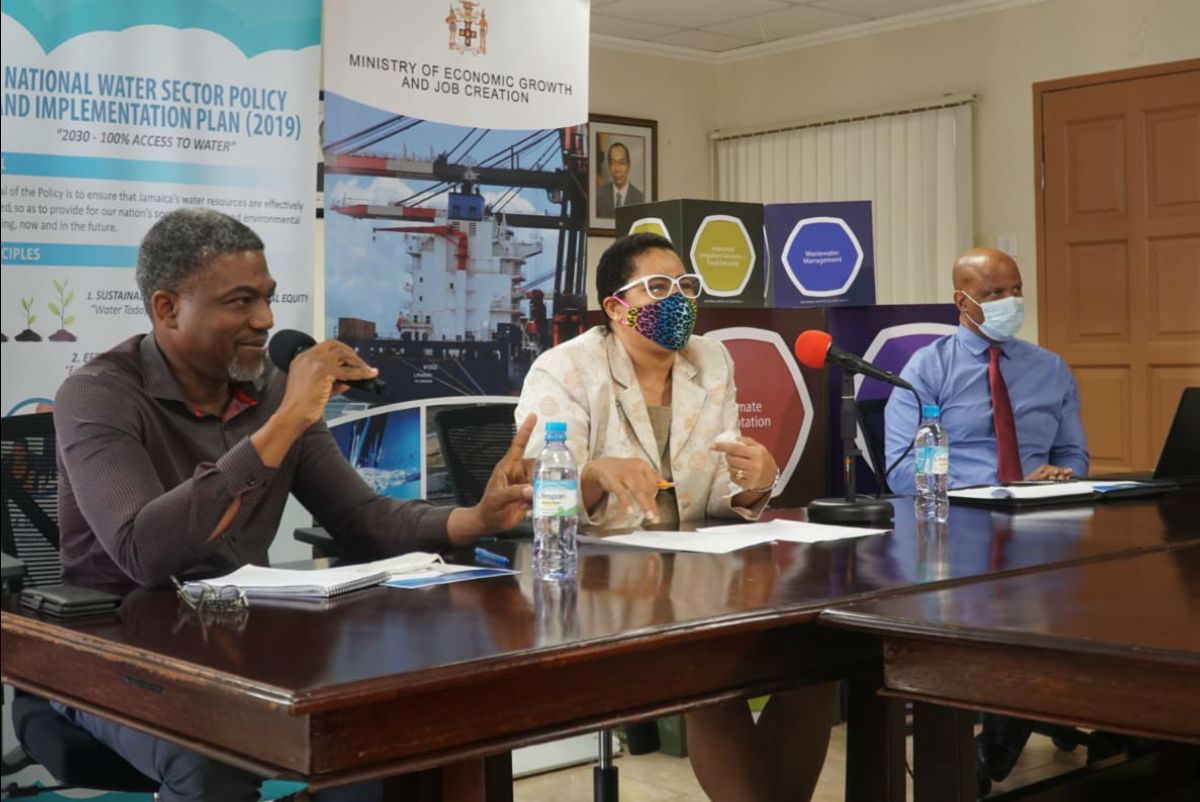 The Ministry of Economic Growth and Job Creation this morning (Tuesday, Sept 22), hosted a virtual information session on water and health in keeping with the measures outlined in the National Water Sector Policy and Implementation Plan 2019. L-R: Mr Michael Williams, Environmental Health Specialist, Ministry of Health and Wellness; Ms Talia Gibson, Acting Director, Water Policy and Monitoring Branch, MEGJC and; Mr Anthony McKenzie, Director, Environmental Management and Conservation, NEPA. The Ministry of Economic Growth and Job Creation this morning (Tuesday, Sept 22), hosted a virtual information session on water and health in keeping with the measures outlined in the National Water Sector Policy and Implementation Plan 2019. L-R: Mr Michael Williams, Environmental Health Specialist, Ministry of Health and Wellness; Ms Talia Gibson, Acting Director, Water Policy and Monitoring Branch, MEGJC and; Mr Anthony McKenzie, Director, Environmental Management and Conservation, NEPA. |
| The Ministry of Economic Growth and Job Creation this morning (Tuesday, September 22) outlined the Standards for Access to Potable Water Supply and Improved Sanitation as stated in the National Water Sector Policy and Implementation Plan 2019 (NWSP). The measure was outlined during a virtual information session held under the theme, Water and Health. Acting Senior Director, Water Policy and Monitoring Branch within the Ministry of Economic Growth and Job Creation (MEGJC), Ms Talia Gibson says the “Policy specifically speaks to Standards for Access to Potable Water Supply and Improved Sanitation and seeks to achieve several service targets”. She explained all households will have access to potable water supply by 2030. This means that the water supply will be: Safe—Potable water will conform to standards set by the Ministry of Health and Wellness (MOHW) and the World Health Organization (WHO); Convenient—Water supply will be delivered to the home, or as close as possible. Water supply should be no more than 500 metres from the home; Of sufficient quantity—Each person will have access to at least 50 litres per day; Reliable— Water supply will be available 24 hours per day, or otherwise on a predictable schedule; and Affordable— Pricing for water will continue to be arrived at by consultation with stakeholders. No one will be denied access to potable water because of an inability to pay. Ms Gibson added that for sanitation “cities and major towns will have sewerage services provided by a utility company. Where sewerage service is not economically feasible, all new developments will have access to safe and environmentally friendly sanitation solutions, which will preserve the privacy and dignity of users. Standards for non-sewerage areas will be established and enforced by the National Building Code, MOHW Regulations, stipulations by the Municipal Corporations and Local Authorities, and National Environment and Planning Agency (NEPA) guidelines”. Presentations were made by Mr Michael Williams, Environmental Health Specialist, Ministry of Health and Wellness and Mr Anthony McKenzie, Director, Environmental Management and Conservation, NEPA. The National Water Sector Policy and Implementation Plan 2019 was tabled in the Houses of Parliament in July 2019. The Policy aims to guide the provision of universal access to potable water and adequate sanitation by 2030. –30– |


